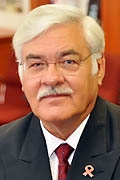Latest News Archive
Please select Category, Year, and then Month to display items
12 October 2020
|
Story Arina Engelbrecht
|
Photo Supplied
 Arina Engelbrecht from Organisational Development and Employee Well-being believes physical activity has a number of benefits for one’s health, including stress relief.
Arina Engelbrecht from Organisational Development and Employee Well-being believes physical activity has a number of benefits for one’s health, including stress relief.
Being physically active plays a big role in preventing the development of mental-health problems and in improving the quality of life of people experiencing mental-health problems.
Treatment for depression
Physical activity can be an alternative treatment for depression. It can be used as a stand-alone treatment or in combination with medication and/or psychological therapy. It promotes all kinds of changes in the brain, including neural growth, reduced inflammation, and new activity patterns are formed that promote feelings of calm and well-being. It releases endorphins – powerful chemicals in the brain that energise your spirit and make you feel good.
Physical activity can be very effective in relieving stress. Research in adults has found that physically active individuals tend to have lower stress levels compared to individuals who are less active. It also leads to improved sleep. When a person sleeps better and feels more rested, overall quality of life improves. They cope better with daily life stressors.
Reduce Alzheimer's risk
Regular physical activity can reduce your risk of developing Alzheimer's disease by up to 50%. It can also slow down further deterioration in those who have already started to develop cognitive problems. It stimulates the brain’s ability to maintain old connections as well as to make new ones.
A study asked people to rate their mood immediately after periods of physical activity (e.g. going for a walk/run, cycling, doing housework) and periods of inactivity (e.g. reading a book or watching television). Researchers found that participants felt more content, more awake, and calmer after being physically active compared to after periods of inactivity.
In conclusion, people who are physically active feel a sense of well-being, feel more energetic throughout the day, sleep better at night, have sharper memories, and feel more relaxed and positive about themselves and their lives.
“Being physically active not only changes your body, it changes your mind,
attitude, and your mood.” – Arina Engelbrecht
UFS academic joins an elite league of achievers
2010-04-14
 |
| Prof. Dingie van Rensburg |
|
Prof. Dingie van Rensburg, Director of the Centre for Health Systems Research & Development at the University of the Free State (UFS), has joined an elite list of a only few distinguished individuals who have been awarded honorary doctorates by the University of Antwerp (UA) in Belgium.
He is only the third South African to be honoured in this way by the UA, following in the footsteps of Constitutional Court Judge Albie Sachs (2000) and former State President, Nelson Mandela (2004).
He is the first social scientist from South Africa to receive this honorary doctorate from the UA – the highest academic distinction of that university. The university has previously only awarded three honorary doctorates to social scientists: Prof. Raymond Boudon, sociologist at the University of Paris-Sorbonne (1995); Prof. Robert Putman, political scientist at Harvard University (2000); and Prof. John Nash (of A Beautiful Mind fame), mathematician and economist at Massachusetts Institute of Technology (MIT) and Princeton.
The award ceremony will take place on 29 April 2010 in Antwerp.
Prof. Van Rensburg has authored, co-authored and was editor of many books/volumes, chapters in books, monographs, research reports and articles in scientific journals. He has also presented and co-presented at numerous national and international conferences; and supervised a significant number of master’s, doctoral and post-doctoral students.
In his 17 years as director of the Centre he has initiated, managed and led approximately 50 research and development projects, several of them large and long-term projects, and many of an inter-institutional and multidisciplinary nature.
In 2002 he became an NRF-rated researcher and in 2007 his rating as an established researcher was renewed. In the past two decades he received several research grants simultaneously from both the National Research Foundation and the Medical Research Foundation of South Africa, mostly for projects on Tuberculosis, HIV/Aids and antiretroviral treatment.
Prof Van Rensburg holds membership of both the Suid-Afrikaanse Akademie vir Wetenskap en Kuns and the Academy for Science of South Africa; he also served for varying periods on the Councils of both these academies. He was also a member of various health bodies of the Free State Province and the National Science and Technology Forum.
Media Release
Issued by: Mangaliso Radebe
Assistant Director: Media Liaison
Tel: 051 401 2828
Cell: 078 460 3320
E-mail: radebemt@ufs.ac.za
14 April 2010
|